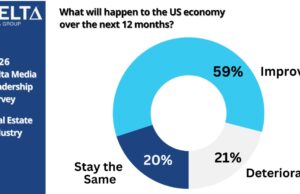To Address the Nation’s Affordable Housing Crisis, Norton Introduces Amendment to Fully Fund Section 8 Housing Vouchers
Reintroduces Her Amendment to Prevent Racial Profiling Passed Last Year
WASHINGTON, D.C. – June 4, 2015 – (RealEstateRama) — Congresswoman Eleanor Holmes Norton (D-DC) will introduce two amendments to the House fiscal year 2016 Transportation, Housing and Urban Development Appropriations (THUD) bill. One Norton amendment would fully fund existing Section 8 Housing Choice Vouchers by replenishing 67,000 Section 8 Housing Choice vouchers that were cut due to sequestration. Norton cited the serious housing crunch in the nation, especially in the District of Columbia, and a severe shortage of low-cost rental units, leaving low-income families without options. The District has had to close its public housing waiting list, including its housing voucher list. The other Norton amendment would prohibit states that receive federal transportation funding from engaging in unconstitutional profiling based on physical characteristics, such as race. Norton got the profiling amendment added to the House fiscal year 2015 THUD appropriations bill and it was included in the fiscal year 2015 omnibus appropriations bill. However, amendments to appropriation bills must be renewed annually. Her amendment seeks to prevent profiling by law enforcement officials and to ensure citizens are not stopped, investigated, arrested, or detained based on their appearance.
In her statement introducing her housing amendment on the floor, Norton said, “It is difficult to think of a more urgent issue confronting the American people. Affordable housing has reached zero in many communities…. In the District of Columbia families where affordable housing has disappeared, must to make $28.25 per hour to afford a two bedroom apartment, making the nation’s capital one of the most expensive housing markets in the country. The District mirrors cities and suburbs throughout the country. The city has had to close its public housing waiting list, which includes vouchers, leaving more than 72,000 people waiting to be placed and thousands more waiting for their chance even to get on the list. What is Congress here for if not to bring if not to bring some relief to millions of families across the country who are most in need.”
In her statement introducing her racial profiling amendment on the floor, Norton said, “Considering our country’s history and increasing diversity, we are late in barring profiling at the national level. At the very least, federal taxpayers should not be compelled to subsidize the unconstitutional practice of profiling by law enforcement officials in the states.
In addition to her racial profiling amendment, last month Norton introduced the Racial Profiling Prevention Act to reestablish a popular federal grant program for states that desire to develop racial profiling laws, collect and maintain data on traffic stops, design programs to reduce racial profiling, and train law enforcement officers. Norton got the grant program included in the federal surface transportation authorization bill that was signed into law in 2005 (the Safe, Accountable, Flexible, Efficient Transportation Equity Act: A Legacy for Users (SAFETEA-LU)). Nearly half of the states participated in the grant program for multiple years before SAFETEA-LU’s funding expired in 2011.
Norton’s full statement introducing her housing voucher amendment on the floor follows.
Statement of
The Honorable Eleanor Holmes Norton
Amendment to H.R. 2 H.R. 2577, the “Transportation, Housing and Urban Development, and Related Agencies Appropriations Act, 2016”
June 3, 2015
I rise to offer an amendment to H.R. 2577, the Transportation, Housing and Urban Development, and Related Agencies Appropriations Act, 2016 that would fully fund the existing Housing Choice Vouchers and replenish the 67,000 vouchers lost due to the fiscal year 2013 sequestration. It is difficult to think of a more urgent issue confronting the American people. Affordable housing has reached zero in many communities.
It is estimated that 2.1 million low-income families utilize the Housing Choice Voucher program. These are the most vulnerable among us, including children, senior citizens, veterans, and persons with disabilities who rely on this important program to keep their families from becoming homeless.
Most families must make roughly $18.92 per hour to afford a two-bedroom apartment, which is more than two-and-a-half times the federal minimum wage. In the District of Columbia, families where affordable housing has disappeared, families must make $28.25 per hour to afford a two- bedroom apartment, making the nation’s capital one of the most expensive housing markets in the country. The District mirrors cities and suburbs throughout the country. For over a decade, District residents have faced increasing rents, stagnant incomes, and the disappearance of affordable rental units. As a result, the city has had to close its public housing waiting list, which includes vouchers, leaving more than 72,000 people waiting to be placed and thousands more waiting for their chance even to get on the list.
My amendment would fund President Obama’s budget request to restore the 67,000 vouchers lost due to the fiscal year 2013 sequestration, bringing urgently needed relief to struggling families across the country.
I urge my colleague to support this amendment. What is Congress here for if not to bring some relief to millions of families across the country who are most in need.
Norton’s full statement introducing her racial profiling amendment on the floor follows.
Statement of the Honorable Eleanor Holmes Norton
on Amendment to H.R. 2577, the Transportation, Housing and Urban Development, and Related Agencies Appropriations Act, 2016, Prohibiting Racial Profiling
June 3, 2014
Mr. Speaker, I rise to offer an amendment to prohibit the use of federal funds to stop, investigate, detain, or arrest people on highways based on their physical appearance in violation of the Fifth and 14th Amendments to the U.S. Constitution and Title VI of the Civil Rights Act of 1964. This is the same amendment I successfully offered to the fiscal year 2015 THUD appropriations bill, and was agreed to by a voice vote on the House floor and was included in the fiscal year 2015 Omnibus. I ask the same for the current amendment, which like the one passed by the House last year, seeks to prevent profiling by law enforcement officials and to ensure citizens are not stopped, investigated, arrested, or detained based on their appearance.
The Supreme Court, in Whren v. U.S., held that profiling based on physical appearance on highways violates equal protection of the laws. Title VI of the 1964 Civil Rights Act enforces the 14th Amendment and applies to funding for all federal agencies and departments. My amendment carries out this Title VI mandate in transportation funding.
Federal guidance regarding the use of race by federal law enforcement agencies finds that racial profiling is not merely wrong, but is also ineffective. Not only Blacks and Hispanics are affected, but many others in our country as well, given the increasing diversity of American society.
The U.S. Department of Justice’s Bureau of Justice Statistics reports that Whites are stopped at a rate of 3.6 percent, but Blacks at 9.5 percent and Hispanics at 8.8 percent, more than twice the rate of Whites. The figures are roughly the same, regardless of region or state. In Minnesota, for example, a statewide study of racial profiling found that African American, Hispanic, and Native American drivers were stopped and searched far more often than Whites, yet contraband was found more frequently in cars where White drivers had been stopped. In Texas, where disproportionate stops and searches of African Americans and Hispanics were found to have taken place, it was also found that Whites more often were carrying contraband.
Earlier this Congress, I reintroduced the Racial Profiling Prevention Act, my bill to reestablish a popular federal grant program aimed at reducing racial profiling. That bill permits states to apply for grants to develop racial profiling laws, to collect and maintain data on traffic stops, to fashion programs to reduce racial profiling, and to train law enforcement officers. Nearly half of the states participated in the program when it was in existence, which shows both the need and interest in tackling this civil rights issue. I got the program included in the surface transportation law in 2005, but the program expired in 2009. I will try to get this bill included in the surface transportation reauthorization bill we will be writing this year, but in the meantime, a formal prohibition on racial profiling is in order. Meanwhile, Congress should have no hesitation in carrying out the 14th Amendment and 1964 Civil Rights Act mandate regarding federal funding of transportation, and neither the House nor Senate hesitated last year.
Considering our country’s history and increasing diversity, we are late in barring profiling at the national level. At the very least, federal taxpayers should not be compelled to subsidize the unconstitutional practice of profiling by law enforcement officials in the states. I urge adoption of this amendment.












